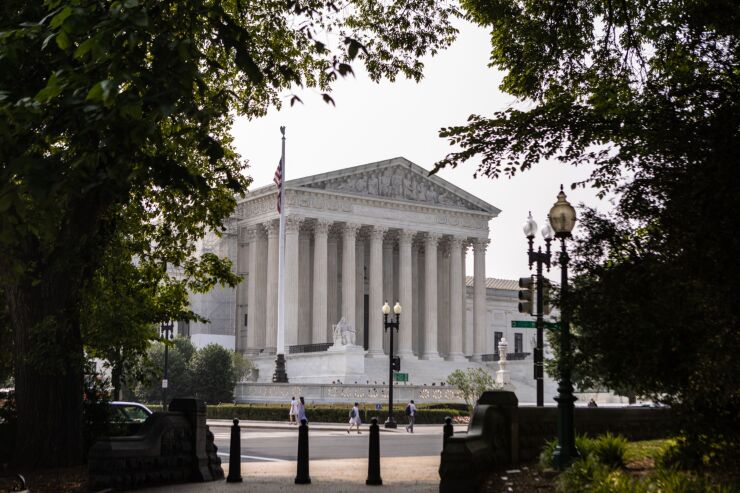
The U.S. Supreme Court will hear a case that could limit the enforcement powers of federal banking regulators, forcing agencies to go to court in situations that would otherwise be handled through administrative processes.
The specific lawsuit involves the Securities and Exchange Commission, but it has big implications for a broad range of U.S. regulators. In the banking realm, those agencies include the Federal Deposit Insurance Corp., the Federal Reserve, the Office of the Comptroller of the Currency and the Consumer Financial Protection Bureau.
Some legal observers say that the justices — who agreed to take the case Friday — are likely to uphold a ruling by the 5th U.S. Circuit Court of Appeals. The appeals court sided with a hedge-fund founder who challenged the SEC's authority to bring an enforcement case through the administrative law system.
In 2018, the nation's highest court ruled against the SEC in a separate case involving the agency's use of administrative law judges, finding that the judges needed to be appointed by the commission itself, rather than by SEC staffers.
"The conservative wing of the Court has shown that they don't like the so-called administrative state. They don't like the federal administrative agencies exercising so much power that they believe belongs to the Congress or to the judiciary," said Alan Kaplinsky, senior counsel at Ballard Spahr.
Federal banking regulators may choose to go straight to court when they are unable to reach settlements in enforcement cases, but they also have the option of bringing civil charges before administrative law judges, who may have specific expertise that U.S. District Court judges lack.
The decisions made by those administrative law judges are subject to approval by the head of the agency that brought the charges. In one case involving a mortgage firm, then-CFPB Director Richad Cordray issued a larger fine than an administrative law judge had recommended, though
Even though defendants can appeal the decisions that emerge from administrative law proceedings, their lawyers have long argued that the use of in-house judges gives an unfair home-field advantage to bank regulators.
"Although in theory they're supposed to be objective, it's just more likely that they're going to be swayed by the arguments that the agency itself makes," said Daniella Casseres, who heads the mortgage regulatory practice group at the law firm Mitchell Sandler.
Last December,
In the case that the Supreme Court has agreed to hear, a panel of judges on the conservative 5th Circuit Court of Appeals previously voted 2-1 to vacate a ruling against hedge-fund founder George Jarkesy.
The judges found multiple problems with the SEC's use of an administrative law judge in the case. One of their arguments was that Congress violated the Seventh Amendment of the U.S. Constitution, which concerns the right to a jury trial, by empowering the SEC to seek civil penalties through certain administrative proceedings.
The U.S. solicitor general's office, which represents the executive branch in cases before the Supreme Court, and which asked the justices to review the 5th Circuit's ruling, argued that the decision casts a cloud over administrative law proceedings at various federal agencies.
"The adverse effects of the court of appeals' decision are not limited to the SEC," the solicitor general's office wrote.
In a separate case earlier this year,
In the hedge-fund founder's case, a ruling against the SEC could potentially hit all federal agencies that use administrative law judges. Or it could affect only some of them, depending on the reasoning that the justices embrace.
One of the theories espoused by the 5th Circuit involved the SEC's procedures to allow for the removal of administrative law judges. Those mechanisms may vary at certain other agencies.
Another issue that the justices would have to address in the event of a ruling against the SEC is whether their decision would only be forward-looking, or conversely, whether it would invalidate prior rulings by administrative law judges.
The Supreme Court has yet to schedule oral arguments in the case. It is expected to issue a ruling by the end of June 2024.






